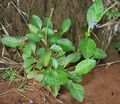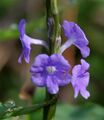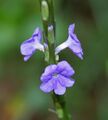Biology:Stachytarpheta jamaicensis
| Stachytarpheta jamaicensis | |
|---|---|
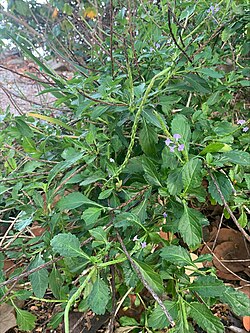
| |
| Scientific classification | |
| Kingdom: | Plantae |
| Clade: | Tracheophytes |
| Clade: | Angiosperms |
| Clade: | Eudicots |
| Clade: | Asterids |
| Order: | Lamiales |
| Family: | Verbenaceae |
| Genus: | Stachytarpheta |
| Species: | S. jamaicensis
|
| Binomial name | |
| Stachytarpheta jamaicensis (L.) Vahl
| |
| Synonyms[2] | |
| |
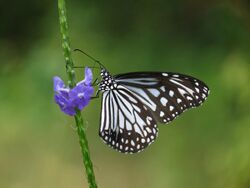
Stachytarpheta jamaicensis is a species of plant in the family Verbenaceae, native throughout the Caribbean,[3] including Florida.[4] It has many common names including blue porterweed, blue snake weed, bastard vervain, Brazilian tea, Jamaica vervain,[5] light-blue snakeweed,[6] and, in St. Croix, worryvine.source? It usually is found along country roadsides, and it also grows well as a ruderal plant on disturbed terrain.
A similar plant, Stachytarpheta cayennensis, which is an invasive species in Florida,[7] is sometimes mistaken for S. jamaicensis.[8]
It is unclear whether S. indica is a separate species.[9]
Medicinal uses
The fresh leaves are consumed in bush tea as a “cooling” tonic and blood cleanser, to treat “asthma” and “ulcerated stomachs”.[10]
Tea brewed from this species has been shown to cause a dose-dependent "fall in [the] blood pressure" of normal rabbits. However, the tea has also been observed to cause a "mild non-dose dependent systematic toxicity" in various tissues throughout the body, "such as congestion, fatty changes, and necrosis in liver, blood vessels, kidney, lung and testis, but the brain, eyes, intestines and heart were essentially normal."[11]
Gallery
in Talakona forest, in Chittoor District of Andhra Pradesh, India
References
- ↑ Bárrios, S.; Copeland, A. (2021). "Stachytarpheta jamaicensis". IUCN Red List of Threatened Species 2021: e.T96816126A192132046. doi:10.2305/IUCN.UK.2021-3.RLTS.T96816126A192132046.en. https://www.iucnredlist.org/species/96816126/192132046. Retrieved 8 December 2022.
- ↑ "The Plant List: A Working List of All Plant Species". http://www.theplantlist.org/tpl1.1/record/kew-195911.
- ↑ "USDA Plants Database". https://plants.usda.gov/home/plantProfile?symbol=STJA.
- ↑ [https://florida.plantatlas.usf.edu/Plant.aspx?id=703}
- ↑ {{citation | mode = cs1 | title = Stachytarpheta jamaicensis | work = Germplasm Resources Information Network (GRIN) | url = | publisher = [[Organization:Agricultural Research ServAgricultural Research Service (ARS), United States Department of Agriculture (USDA) | access-date = 19 January 2018 }}
- ↑ "Stachytarpheta jamaicensis". Natural Resources Conservation Service PLANTS Database. USDA. https://plants.usda.gov/core/profile?symbol=STJA.
- ↑ "Florida Invasive Species Council". https://floridainvasivespecies.org/plantlist2019.cfm.
- ↑ "Blue porterweed". 17 September 2021. https://www.flawildflowers.org/flower-friday-stachytarpheta-jamaicensis/.
- ↑ www.flowersofindia.net, Indian Snakeweed
- ↑ Brian N. Becker, Integration Of Medicinal And Culinary Herbs In An Agroforestry Combination On St. Croix, United States Virgin Islands (PDF)
- ↑ Professor MacDonald Idu. "The Plant called Medicine (PDF)". http://www.uniben.edu/sites/default/files/inaugural_lectures/Prof_M.Idu_.pdf.
External links
Wikidata ☰ Q3556295 entry
 |


